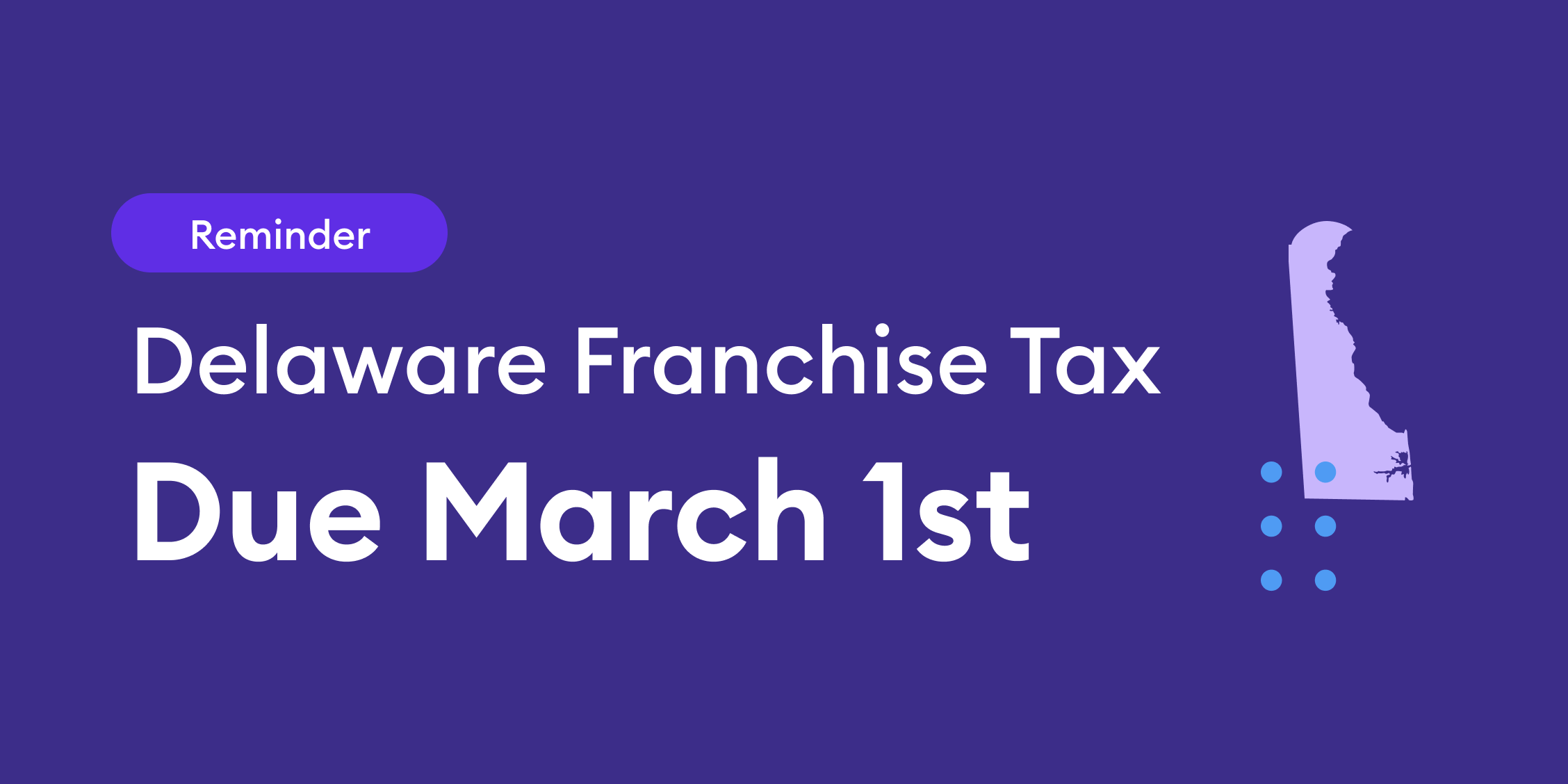How to File Your Delaware Franchise Tax On Time
A confirmation email has been sent to your email.

Time is running out to pay the Delaware franchise tax: the annual deadline is March 1. If you still need to take care of yours, don’t lose hope: the process is actually pretty simple.
Who Needs to Pay the Delaware Franchise Tax?
The Delaware franchise tax must be paid by all companies that are incorporated in Delaware, regardless of whether or not you’ve generated any revenue or profit (technically, this filing is the “franchise tax and annual report”).
This means it’s easy to determine if you owe this tax: if your company is incorporated in Delaware, then yes, you need to pay the Delaware franchise tax.
How to Pay the Delaware Franchise Tax
If you have a tax preparer, they might do this for you— – it’s a good idea to ask, and many will handle it free of charge (Pilot Tax, for example, will take care of this for you).
If you don’t have a tax preparer (or if it’s too last-minute for them to help you with this), here’s how to handle it yourself. The process might look intimidating, but it’s actually pretty straightforward, and we’ll walk you through the trickiest parts.
Step 1
Visit Delaware’s website for paying the tax, click on “Pay Taxes / File Annual Report,” and enter your information as prompted.
Step 2
Click on “File annual report.”
You will most likely see a very large “amount due,” possibly in the tens of thousands of dollars. Don’t panic! There are two methods to calculate the amount of tax you owe, and you can use whichever one is lower. Those methods are:
- Authorized shares: - This bases your tax obligation amount on the total number of shares authorized in your company charter, regardless of the number of actual shares outstanding. For startups, this method tends to result in much higher numbers than using the assumed par value method. (This is the default method used by the Delaware Division of Corporations to calculate your taxes, which is why the initial number is often alarmingly large.)
- Assumed par value: - This bases your tax obligation amount on a mix of issued shares and gross assets. For startups and small companies, this method usually results in a much lower tax value. The minimum tax using this method is $400. This is almost certainly the method you’re going to use.
You can learn more about the calculation methods on Delaware’s franchise tax website.
Step 3
If you want to use the assumed par value method, enter all of the stock information details into the relevant table then click “Recalculate Tax.”
Some key pointers:
- If you use the assumed par value method, you’ll be asked for your issued share count and your gross assets.
- For “issued shares,” provide the total number of shares the company has issued. It doesn’t matter how many of them have vested — you want to know the total number you’ve actually issued (you can ignore unconverted SAFEs or convertible notes here — you’re just focusing on the number of shares that have been issued).
- For “gross assets,” you’ll want to enter the “Total Assets” number from last year’s year-end balance sheet. This will most likely just be your bank balance as of 12/31, but check with your finance professional if you have any questions.
Step 4
In the boxes that follow, enter the following information:
- Your actual business address — not the address of your Delaware registered agent — as your “principal place of business.” If your company doesn’t have a physical office, it’s OK to use your home address.
- The name, address, and contact details for one of your company’s officers, such as the CEO or CFO. This is generally whoever is signing the annual franchise tax report.
- The name, address, and contact details of everyone who’s currently on your board of directors.
Pay your taxes once you authorize, review, and verify all of the information that was provided. Once you have the amount that you owe, you’ll be able to pay it through the website. For early-stage startups, we expect this amount to be about $400 per $1 million in gross assets, plus a $50 filing fee.
It’s important to pay on time to remain in good standing with the state of Delaware, and avoid potential problems down the line.
Can a Tax Preparer File the Delaware Franchise Tax on Your Behalf?
Yes, there are a number of Delaware Franchise Tax filing providers who can do these steps on your behalf. However, you’ll need to provide them all the same information we discussed above, which means you’ll still have to do the work of finding and assembling it. For nearly the same effort, you can then simply file the tax yourself, and save on provider service fees.
If you have a full-service tax provider, they may take care of this for you at no additional fee (for example, Pilot Tax subscribers have Delaware franchise tax filings included in their service).
Once you’ve filed your Delaware franchise tax, you’re good for another year – but you might not be done thinking about taxes just yet. The federal corporate income tax deadline is fast approaching. If you don’t have a tax preparer, don’t wait until the last minute! Get tax help now, to avoid scrambling at the deadline.
Still have questions about the Delaware franchise tax? We’re always happy to help.


